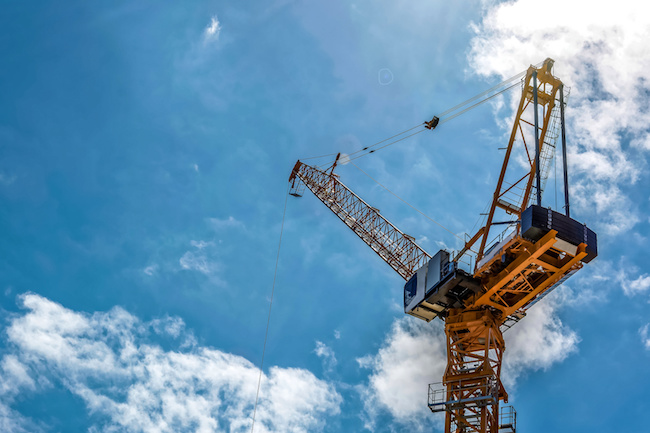
Carrying out construction work in Québec: What you should know
By Gabriel Lefebvre, Audrey Alarie and Dayeon Min
Law
A crane on a construction site in Montreal. The province presents a number of obstacles for contractors from other jurisdictions looking to enter the market
With far different regulations than most other Canadian provinces, Québec presents a unique challenge for contractors from other jurisdictions looking to take on work in the province. While it is by no means exhaustive, this article aims to summarize the particularities and requirements for carrying out construction work in Québec.
CONTRACTOR LICENSE
In order to carry out any type of work, a contractor must obtain a construction licence issued by the Régie du bâtiment du Québec. To obtain the licence, the company has to be registered in the province, offer financial guarantees and most importantly, demonstrate professional competency. Key individuals within the company will act as guarantors and undergo an evaluation of their professional competency.
PUBLIC PROCUREMENT AND INTEGRITY REQUIREMENTS
The Act Respecting Contracting by Public Bodies (ACPB) determines the conditions applicable to public contracts awarded to contractors. Public contract bidders must tender through the provided electronic tendering system and fulfill French language requirements.
To enter into a public contract, enterprises must obtain an authorization from the Autorité des marchés publics (AMP). Contractors required to obtain an authorization from the AMP are those that are competing in a call for tenders or an award process for contracts with the Québec government involving an expenditure equal to or greater than the thresholds determined by the government.
This requirement applies to each contract and subcontract flowing down from the public body. The AMP will refuse to grant an authorization if any of the majority shareholders, directors or officers of the company have been found guilty of an offence listed under the ACPB, such as bribery or fraud.
This process is a long and complex one that involves disclosing the business relationships of the parties controlling the company. If the authorization is denied, the company will be barred from entering any public contract or subcontract. An authorization granted to an enterprise is valid for three years.
LABOUR RELATIONS AND SOCIAL BENEFITS PLANS
Québec’s labour relations system in construction is unique. The main characteristics of that special labour relations system are:
- Province-wide and multi-trade negotiations
- Working conditions applicable to the entire industry province-wide
- Four sector-based collective agreements with common clauses
- An obligatory vocational qualification system for workers
The Act respecting labour relations, vocational training and workforce management in the construction industry (R-20) governs the industry. The Commission de la construction du Québec (CCQ) is the public body responsible for its application. Under R-20, contractors must assume certain responsibilities such as registering with the CCQ and hiring workers who hold a competency certificate on a regional basis. Generally speaking, employers must also give priority to hiring workers residing in the region where the construction site is located before using workers from other regions, but there is an exception for construction employees coming from Ontario following an interprovincial agreement.
OCCUPATIONAL HEALTH AND SAFETY
The Commission des normes, de l’équité, de la santé et de la sécurité du travail (CNESST) is the body to which the Government of Québec has entrusted the promotion of labour rights and obligations. In the area of occupational health and safety, the CNESST aims to ensure health and safety is taken care of in the workplace, compensates victims of occupational injuries and provides for their rehabilitation.
Its constituent act, the Act respecting occupational health and safety (AROHS) deals with the prevention of work-related accidents and diseases. To ensure compliance with the laws and regulations it administers, CNESST appoints inspectors who visit workplaces and construction sites to verify compliance with safety standards. They have the power to enforce the law by issuing remedial orders, by ordering the suspension of work or the complete or partial shutdown of a workplace, and by affixing seals. Inspectors may also report non-compliance to CNESST, which can result in the issuance of statements of offence.
The AROHS applies primarily to employers and principal contractors and provides for obligations that are more general. More specific to construction sites is the Safety Code for the construction industry (SCCI), which sets out a multitude of rules for employers and contractors. Some of these obligations arise even before work begins on-site.
CONCLUSION
In light of the various regulatory requirements for carrying out construction work in Québec, contractors from other jurisdictions should prepare and consult with construction law specialists long before they start work in la belle province.
Gabriel Lefebvre practices Construction Law, Audrey Alarie practices Labour and Employment Law and Dayeon Min is an articling student at Borden Ladner Gervais LLP.
This article is for information purposes only and may not be relied on for legal advice. Please send comments to editor@on-sitemag.com.
This column first appeared in the March 2020 edition of On-Site. You can read through the whole issue here.





